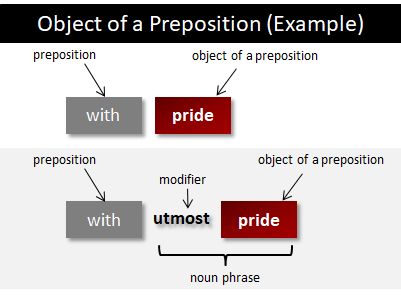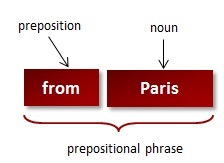Prepositions
A preposition is a word (often a short word) that expresses the relationship between two other nearby words. In the examples below, each preposition (highlighted) shows us the relationship between the word book and the word wizard.- The book about the wizard
- The book by the wizard
- The book near the wizard
- The book behind the wizard
- The book under the wizard
List of Common Prepositions
Here is a list of common prepositions:above, about, across, against, along, among, around, at, before, behind, below, beneath, beside, between, beyond, by, down, during, except, for, from, in, inside, into, like, near, of, off, on, since, to, toward, through, under, until, up, upon, with, within
Click on Two Prepositions
bright
Wrong
adjective
whispering
Wrong
adjective
urgently
Wrong
adverb
opportunity
Wrong
abstract noun
straight
Wrong
adjective
delightfully
Wrong
adverb
old
Wrong
adjective
in
Correct!
preposition
with
Correct!
preposition
Master Mind Classes
The Role of a Preposition
A preposition precedes a noun (or a pronoun) to show the noun's (or the pronoun's) relationship to another word in the sentence. In each example above, the preposition preceded the noun the wizard to show that noun's relationship with the noun The book.Here are some more examples:
- It is a container for butter. (The preposition for shows the relationship between butter and container.)
- The eagle soared above the clouds. (The preposition above shows the relationship between eagle and clouds.)
- He is the President of the United States. (The preposition of shows the relationship between the United States and President.)
A Good Way to Think about Prepositions
When you're first learning about prepositions, it is useful to think about prepositions as anywhere a mouse could go.
Real-Life Examples of Prepositions
- I cook with wine. Sometimes, I even add it to food. (Actor W C Fields) (With shows the relationship between wine and cook. To shows the relationship between food and add it.)
- Behind every great man is a woman rolling her eyes. (Actor Jim Carrey) (Behind shows the relationship between every great man and is. The term every great man is a noun phrase. Note that a preposition can sit before a noun, a noun phrase, a noun clause, or a pronoun.)
- The difference between stupidity and genius is that genius has its limits. (Physicist Albert Einstein) (Between shows the relationship between stupidity and genius.)
- If you haven't got anything nice to say about anybody, come sit next to me. (Writer Alice Roosevelt Longworth) (About shows the relationship between anybody and to say. Next to shows the relationship between me and sit. Note that a preposition can be more than one word. Other common multi-word prepositions are close to, ahead of, in front of, and according to.)
Origin of the Word Preposition
The word preposition comes from the idea of being positioned before.Object of a Preposition
The word (or words) that follows a preposition is called the object of a preposition. If there is a preposition, there will always be an object of the preposition. A preposition cannot exist by itself.
Prepositional Phrase
A prepositional phrase is made up of a preposition and the object of the preposition (including any modifiers). Prepositional phrases are very common. They function as either adjectives or adverbs. For example (prepositional phrases highlighted):- It is a message from Mark. (Here, the prepositional phrase from Mark is functioning like an adjective because it is describing message.)
- Mark is trapped on the island. (Here, the prepositional phrase on the island is functioning like an adverb because it is modifying the verb is trapped.)

Why Should I Care about Prepositions?
There are four common issues involving prepositions:(Issue 1) Try to avoid ending a sentence in a preposition.
Have a look at our poll. It tells us the percentage of people who still think you can't end a sentence with a preposition.
Here's the rub. Even though you'd very likely be correct by ending your sentence with a "preposition," you should be mindful that a fair few of your readers will think it's a grammar mistake or sloppy writing. As we still haven't trained ourselves to strikethrough this so-called ruling, we can't ignore it. I like to think of "avoiding a preposition at the end of a sentence" as a game rather than a ruling. Let's look at an example:
- It is a scenario I have not thought of. (This is natural sounding, but it ends in a preposition.)
- It is a scenario of which I have not thought. (This sounds awful. It's unnatural and contrived. On the plus side, our preposition now sits before the pronoun which, and that fits the rule for siting a preposition.)
- It is a scenario I have not considered. (Yes! This sounds natural, and it does not end in a preposition. This keeps everyone happy...except those people who think we shouldn't pander to those who still think you can't end a sentence in a preposition.)
So, why was preposition in quotation marks earlier in this section? Well, quite often, your sentence will end in something that looks like a preposition but isn't. Be mindful that it could be part of a phrasal verb, i.e., a verb made up of a verb and another word (either a preposition or a particle), e.g., fill in, stick to, catch up, catch out. Quite often, these words must be next to each other, and that's often a factor in your sentence structure.
The best way to avoid a preposition at the end of a sentence is to choose a non-phrasal verb with the same meaning. This usually leads to a shorter, better-flowing sentence. That's the best reason to avoid a preposition at the end of a sentence.
- It is a scenario we should not put up with. (This is sloppy, but it's not technically wrong.)
- It is a scenario we should not tolerate.
 (This is much sharper.)
(This is much sharper.)
(Issue 2) Don't use the wrong case after a preposition.
The word or words that follow a preposition are called the object of a preposition. The object of a preposition is always in the objective case. This just means that words like I, she, we, and they change to me, her, us, and them when they follow a preposition (e.g., about me, with her, for us, against them). This is a pretty simple concept for a native English speaker, but it still catches some people out.- It is present from my wife and I.
 (This is wrong because I cannot be the object of the preposition from.)
(This is wrong because I cannot be the object of the preposition from.)
- It is present from me and my wife.

- Between you and I
 (This is wrong because I cannot be the object of the preposition between.)
(This is wrong because I cannot be the object of the preposition between.)
- Between you and me

Another one that catches people out is using who after a preposition. Who becomes whom in the objective case. In other words, who is to whom as he is to him or they is to them. The bottom line is who cannot be the object of a preposition. You need whom.)
- You went with who?

- You went with whom?
 (Write whom after a preposition.)
(Write whom after a preposition.)
(Issue 3) Don't confuse prepositions with other words.
Writers sometimes confuse prepositions with other words. Here are the most common issues ordered by how frequently they are seen:- Writing the adverb too (which means overly or as well) instead of the preposition to (which has several meanings including towards and for).
- Writing the preposition of instead of have when writing could've, should've, or would've in full.
- Writing the noun dependant (a person, usually a child or spouse) in the multi-word preposition dependent on (which means reliant on).
- Writing the preposition past (beyond) instead of passed (past tense of to pass).
- Writing the preposition between (usually used with two distinct points) instead of the preposition among (in the middle of a group).
(Issue 4) Keep your writing succinct.
Some phrasal verbs (i.e., multi-word verbs) have prepositions that do not add anything. When you encounter one of these, delete the prepositions to improve succinctness.- I cannot face up to the consequences. (This is correct, but it's not succinct.)
- I cannot face the consequences. (This is sharper. The prepositions were a waste of ink.)
Key Points
- You can end a sentence in a preposition, but you run the risk of irking people who still think you can't.
- Don’t say "between you and I" or "from my wife and I." They're both wrong.
- "Too" means overly or as well. "To" doesn't.
- Write "have" not "of" when expanding a contraction like "would've."
- "Dependent on" means reliant on. A "dependant" is a person.

No comments:
Post a Comment